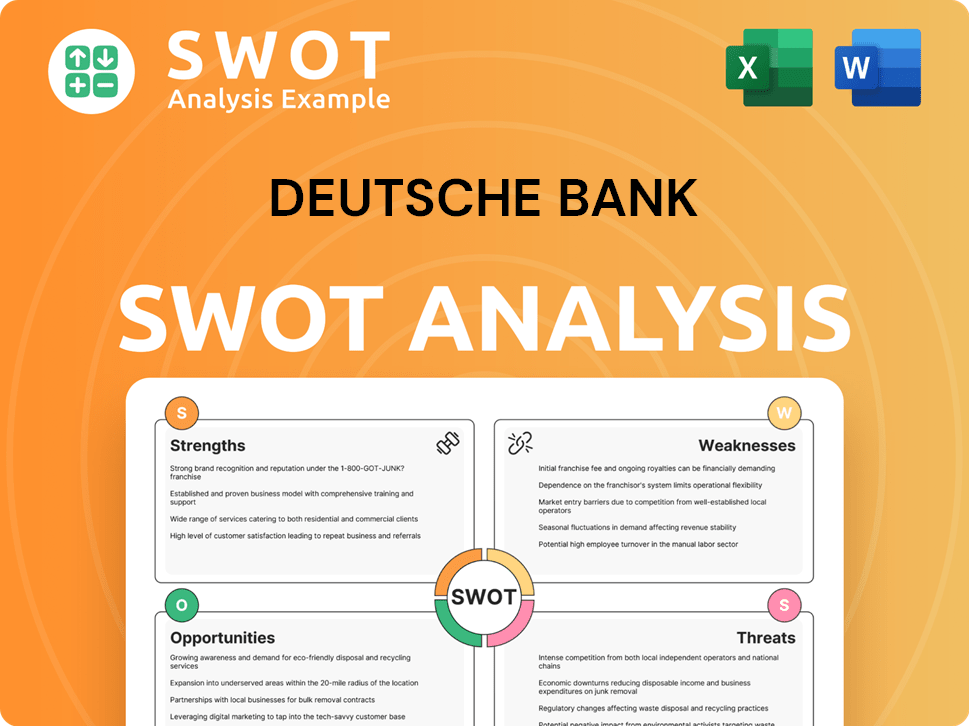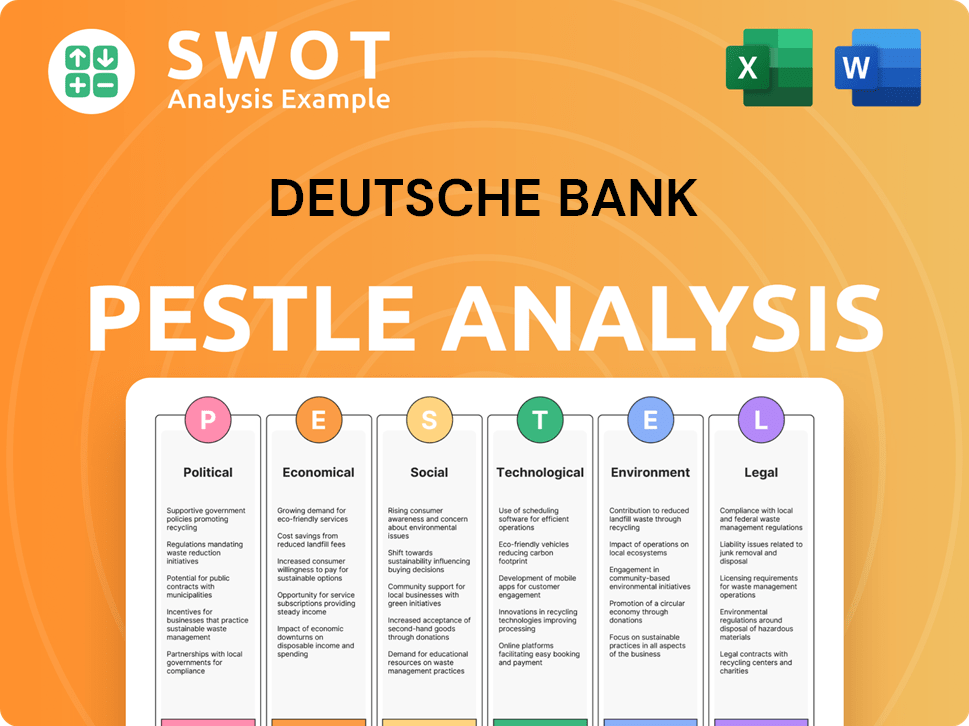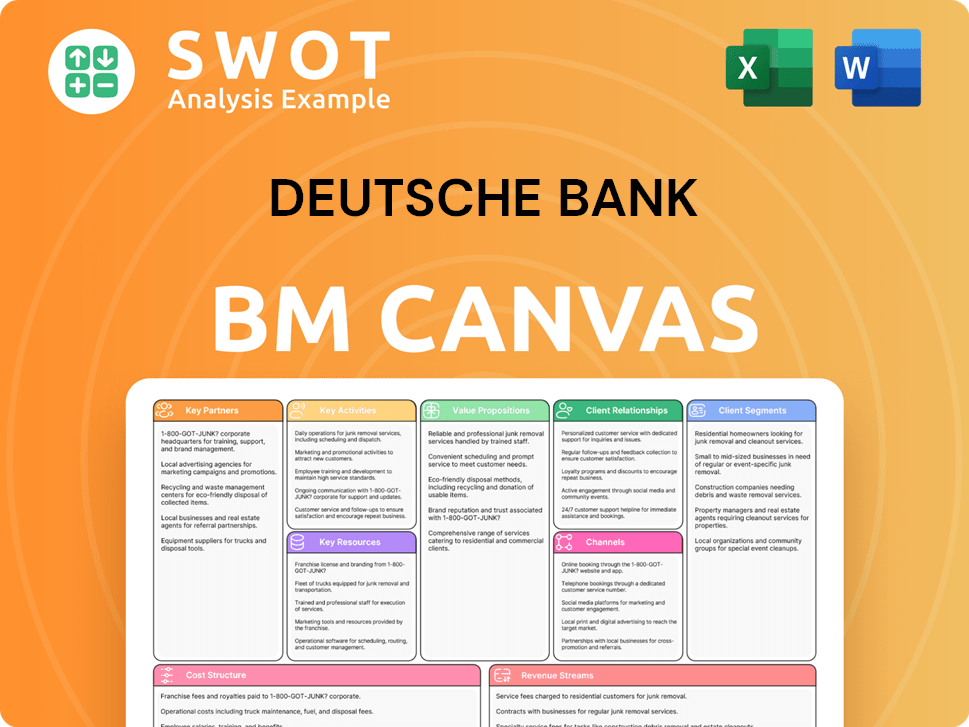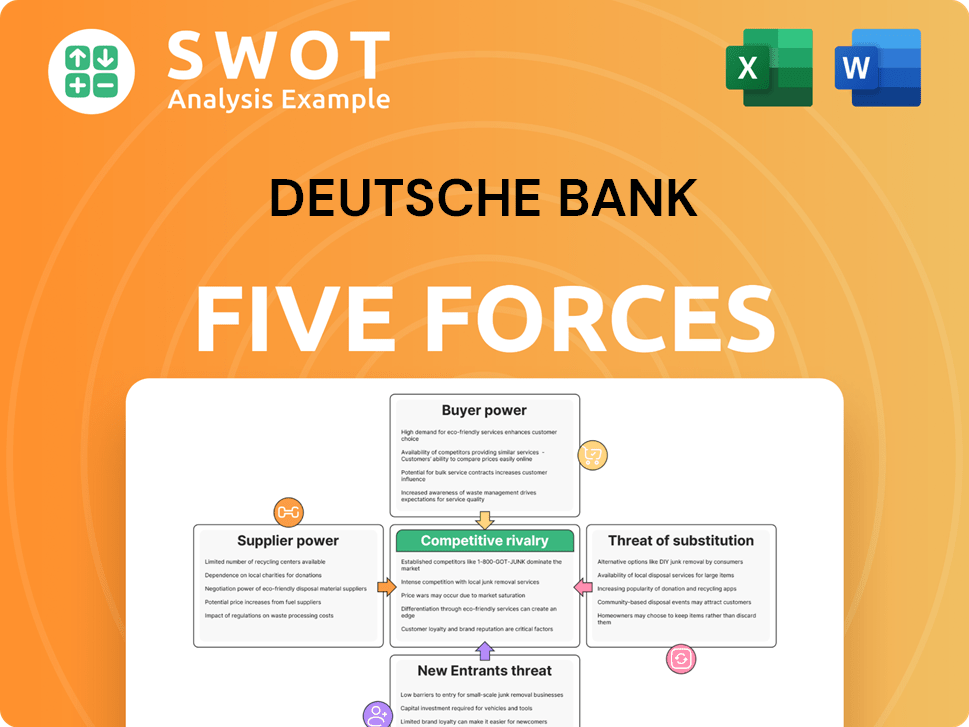Deutsche Bank Bundle
How Does Deutsche Bank Stack Up in Today's Financial Arena?
The financial world is a battlefield, and Deutsche Bank, a titan of global finance, is constantly vying for dominance. Recent shifts towards digital banking and sustainable finance highlight the intense competition within the industry, forcing institutions to adapt or risk being left behind. To understand Deutsche Bank's position, we must dissect its competitive landscape, exploring its rivals and strategic moves.

Deutsche Bank's competitive landscape is shaped by its global presence and diverse service offerings, from investment banking to retail services. Understanding its Deutsche Bank SWOT Analysis is key to recognizing its strengths and weaknesses against its competitors. This analysis provides critical insights into Deutsche Bank's market position and how it navigates the challenges within the banking industry, ultimately influencing its strategic choices and future prospects. A thorough banking industry analysis is essential to understanding the competitive dynamics.
Where Does Deutsche Bank’ Stand in the Current Market?
Deutsche Bank maintains a significant market position within the global financial services industry. Its standing fluctuates across different segments and geographies. The bank is consistently ranked among the top global investment banks, especially in areas like M&A advisory and debt capital markets. For the full year 2023, the bank reported a net income of €4.2 billion, marking its fourth consecutive year of profit, which indicates sustained recovery and financial health. This demonstrates its resilience and ability to navigate the complexities of the banking industry.
The bank's primary product lines and services include investment banking, commercial and retail banking, transaction banking, and asset management. Its investment banking division provides M&A advisory, debt and equity capital markets, and sales and trading services. The corporate bank offers cash management, trade finance, and securities services. Its private bank serves high-net-worth individuals and retail clients with wealth management, lending, and deposit products. Deutsche Bank’s diverse offerings cater to a broad range of customer segments, from large multinational corporations to small and medium-sized businesses and private individuals. This comprehensive approach helps to solidify its market position.
Geographically, Deutsche Bank has a substantial global presence, with a strong foothold in Germany and significant operations across Europe, the Americas, and Asia Pacific. Its common equity tier 1 (CET1) ratio stood at a robust 13.7% at the end of 2023, exceeding its target of 13.0% and demonstrating strong capital reserves compared to industry averages. This global reach and strong financial foundation are crucial for maintaining its competitive edge in the financial services competition.
Deutsche Bank's core operations span investment banking, commercial and retail banking, transaction banking, and asset management. The investment banking division provides advisory services, capital markets solutions, and sales and trading. Corporate banking offers cash management and trade finance, while private banking serves high-net-worth individuals. This diversified approach allows Deutsche Bank to serve a wide range of clients globally.
The value proposition of Deutsche Bank is centered around providing comprehensive financial services to a global clientele. It focuses on delivering expert advice, innovative financial solutions, and robust transaction capabilities. Deutsche Bank aims to be a trusted partner for its clients, supporting their financial goals through a combination of global reach and local expertise. The bank's strategic initiatives, as highlighted in Marketing Strategy of Deutsche Bank, are designed to enhance its value proposition.
Deutsche Bank's market position is shaped by its global presence, diverse service offerings, and strategic initiatives. The bank competes with major players in investment banking and across various financial sectors. Its ability to adapt to market changes and maintain a strong capital base is crucial for its sustained success.
- Global Reach: Strong presence in Europe, the Americas, and Asia Pacific.
- Diverse Services: Investment banking, commercial and retail banking, transaction banking, and asset management.
- Strategic Transformation: Restructuring and focus on core strengths, including digital transformation.
- Financial Performance: Consistent profitability and a robust CET1 ratio.
Deutsche Bank SWOT Analysis
- Complete SWOT Breakdown
- Fully Customizable
- Editable in Excel & Word
- Professional Formatting
- Investor-Ready Format

Who Are the Main Competitors Challenging Deutsche Bank?
The Revenue Streams & Business Model of Deutsche Bank are significantly influenced by the competitive landscape it navigates. Understanding the Deutsche Bank competitive landscape is crucial for assessing its financial performance and strategic positioning. The bank's ability to generate revenue and maintain profitability hinges on its capacity to compete effectively against a diverse set of rivals across various business segments.
Deutsche Bank competitors span a wide spectrum, from global investment banks to local retail banking institutions and emerging fintech companies. This competitive environment necessitates continuous adaptation and innovation to maintain or improve market share. This analysis provides a comprehensive overview of the key players and the dynamics shaping Deutsche Bank's competitive position.
Deutsche Bank's market position is constantly challenged by the actions of its competitors. The Banking industry analysis reveals a dynamic environment where strategic initiatives and market trends significantly impact performance. The following sections will detail the key competitors and the competitive pressures Deutsche Bank faces.
In global investment banking, Deutsche Bank competes with major players such as JPMorgan Chase, Goldman Sachs, Morgan Stanley, Bank of America, and Citigroup. These institutions are direct rivals in areas like M&A advisory, equity and debt capital markets, and sales and trading. JPMorgan Chase often leads in overall investment banking league tables, posing a significant challenge.
Within its commercial and retail banking operations, particularly in Europe and Germany, Deutsche Bank faces competition from Commerzbank, UniCredit, BNP Paribas, and Santander. These competitors vie for market share in corporate lending, retail deposits, and payment services. Competition often centers on interest rates and digital banking services.
In transaction banking, Deutsche Bank competes with Citi, HSBC, and JPMorgan Chase. These banks target large corporate clients needing cash management, trade finance, and securities services. The competitive dynamics in this area involve technology platforms, global reach, and operational efficiency.
DWS Group, Deutsche Bank's asset management arm, competes with BlackRock, Vanguard, Amundi, and boutique firms. These competitors challenge DWS through product innovation, performance, and distribution capabilities.
Fintech companies are challenging traditional banks in payments, lending, and wealth management. Large technology companies are also entering financial services, posing a long-term threat. Mergers and alliances impact competitive dynamics by creating larger rivals with enhanced scale and offerings.
The competitive landscape is constantly evolving, with factors such as economic conditions, regulatory changes, and technological advancements influencing the strategies of all players. For instance, in 2024, the investment banking revenue pool is expected to be around $300 billion globally, with the top five banks controlling a significant portion of the market. The rise of digital banking and fintech has led to increased pressure on traditional banks to innovate and reduce costs to remain competitive.
Deutsche Bank's strategy must address the challenges posed by its competitors. Deutsche Bank's main rivals such as JPMorgan Chase and Goldman Sachs, often have a larger global footprint and stronger advisory franchises. Deutsche Bank's competitive advantages include its strong presence in Europe and its transaction banking capabilities. However, it faces challenges in maintaining market share in investment banking and adapting to the rapid changes in digital banking.
- Deutsche Bank's market share analysis reveals fluctuations in its position across different business segments.
- Deutsche Bank's global presence compared to competitors shows a strong European base, but it is less dominant in the US market.
- Deutsche Bank's financial performance vs competitors is influenced by its ability to manage costs and generate revenue in a competitive environment.
- Deutsche Bank's strengths and weaknesses analysis highlights its strengths in transaction banking and its weaknesses in investment banking relative to some competitors.
Deutsche Bank PESTLE Analysis
- Covers All 6 PESTLE Categories
- No Research Needed – Save Hours of Work
- Built by Experts, Trusted by Consultants
- Instant Download, Ready to Use
- 100% Editable, Fully Customizable

What Gives Deutsche Bank a Competitive Edge Over Its Rivals?
Understanding the Deutsche Bank competitive landscape requires a deep dive into its core strengths. The bank's global network and client relationships are key differentiators in the banking industry analysis. Its strategic moves, particularly in technology, also shape its competitive edge against rivals.
Deutsche Bank's long history and established brand equity are significant advantages. These factors contribute to its market position, allowing it to compete effectively in the complex financial services sector. A focus on technology and digital transformation is crucial for future success.
The bank's diversified business model, spanning investment banking, commercial and retail banking, transaction banking, and asset management, provides resilience. This diversification helps mitigate risks associated with downturns in any single business line. This broad offering allows for cross-selling opportunities and deeper client engagement.
Deutsche Bank's extensive global reach, particularly in Europe, the Americas, and Asia, is a significant competitive advantage. This allows it to serve multinational corporations and institutional clients with complex cross-border financial needs. The bank's leading position in transaction banking highlights its operational expertise and global network.
With over 150 years of operation, Deutsche Bank has cultivated enduring relationships with corporations, governments, and institutional investors. This fosters trust and loyalty, which is invaluable in investment banking. Despite past challenges, the bank's brand equity continues to resonate globally, signifying stability and expertise.
Deutsche Bank is increasingly leveraging technology as a competitive differentiator. Its strategic partnership with Google Cloud aims to enhance data analytics, artificial intelligence, and cloud-based services. This can lead to improved operational efficiencies and more personalized customer offerings.
The bank's diversified business model, spanning investment banking, commercial and retail banking, transaction banking, and asset management, provides a degree of resilience. This diversification helps mitigate risks associated with downturns in any single business line. This broad offering allows for cross-selling opportunities and deeper client engagement.
Deutsche Bank's competitive advantages include its global network, strong client relationships, and technological investments. These factors contribute to its market position and ability to compete effectively. The bank's focus on digital transformation is crucial for future success.
- Extensive Global Network: Serving multinational clients with cross-border financial needs.
- Strong Client Relationships: Cultivating trust and loyalty with corporations and investors.
- Strategic Technology Investments: Enhancing operational efficiencies and customer offerings.
- Diversified Business Model: Mitigating risks and fostering cross-selling opportunities.
Deutsche Bank Business Model Canvas
- Complete 9-Block Business Model Canvas
- Effortlessly Communicate Your Business Strategy
- Investor-Ready BMC Format
- 100% Editable and Customizable
- Clear and Structured Layout

What Industry Trends Are Reshaping Deutsche Bank’s Competitive Landscape?
The global financial services industry is undergoing significant transformation, presenting both challenges and opportunities for Deutsche Bank. Technological advancements, regulatory changes, and evolving consumer preferences are reshaping the competitive landscape. Understanding these trends is crucial for assessing Deutsche Bank's market position and future prospects. This analysis provides an overview of the industry dynamics, potential risks, and strategic opportunities impacting Deutsche Bank.
Deutsche Bank's competitive landscape is influenced by several key factors. These include the rise of fintech companies, increasing regulatory scrutiny, and geopolitical uncertainties. The bank's ability to adapt to these changes, leverage technological advancements, and maintain a strong financial position will determine its success. In 2023, the bank reported a Common Equity Tier 1 (CET1) ratio of 13.7%, reflecting its strong capital base.
Digitalization, AI, and blockchain are reshaping financial services, creating new customer expectations and operational models. Regulatory changes, including those related to capital requirements and risk management, continue to influence the industry. Consumer preferences are shifting towards personalized, digital, and sustainable financial services. These trends significantly impact the Growth Strategy of Deutsche Bank.
Fintech disruptors and challenger banks pose a threat by offering niche services at lower costs. Intense competition in investment banking segments could pressure fees and margins. Geopolitical shifts and macroeconomic uncertainties, such as inflation and interest rate fluctuations, affect banking revenues. The bank's ability to navigate these challenges will be crucial.
Emerging markets offer significant growth potential due to rising demand for financial services. Product innovations in sustainable finance, digital assets, and personalized wealth management present avenues for differentiation. Strategic partnerships, such as the collaboration with Google Cloud, are crucial for accessing new technologies. Deutsche Bank can leverage these opportunities to strengthen its market position.
Deutsche Bank is focusing on core strengths, investing in technology, and maintaining a robust capital position. The bank is expanding its sustainable finance offerings to meet growing client demand. Strategic partnerships are being formed to enhance capabilities and access new markets. These initiatives are designed to improve the bank's competitive standing.
Deutsche Bank's strategic focus includes digital transformation, sustainable finance, and strengthening its core businesses. The bank must navigate regulatory complexities and manage geopolitical risks effectively. Adapting to evolving client demands and leveraging technological advancements will be crucial for long-term success. The bank's commitment to these areas will determine its future in the competitive landscape.
- Invest in digital transformation and AI to enhance customer experience.
- Expand sustainable finance offerings to capitalize on growing demand.
- Strengthen risk management and compliance to meet regulatory requirements.
- Explore strategic partnerships to access new technologies and markets.
Deutsche Bank Porter's Five Forces Analysis
- Covers All 5 Competitive Forces in Detail
- Structured for Consultants, Students, and Founders
- 100% Editable in Microsoft Word & Excel
- Instant Digital Download – Use Immediately
- Compatible with Mac & PC – Fully Unlocked

Related Blogs
- What are Mission Vision & Core Values of Deutsche Bank Company?
- What is Growth Strategy and Future Prospects of Deutsche Bank Company?
- How Does Deutsche Bank Company Work?
- What is Sales and Marketing Strategy of Deutsche Bank Company?
- What is Brief History of Deutsche Bank Company?
- Who Owns Deutsche Bank Company?
- What is Customer Demographics and Target Market of Deutsche Bank Company?
Disclaimer
All information, articles, and product details provided on this website are for general informational and educational purposes only. We do not claim any ownership over, nor do we intend to infringe upon, any trademarks, copyrights, logos, brand names, or other intellectual property mentioned or depicted on this site. Such intellectual property remains the property of its respective owners, and any references here are made solely for identification or informational purposes, without implying any affiliation, endorsement, or partnership.
We make no representations or warranties, express or implied, regarding the accuracy, completeness, or suitability of any content or products presented. Nothing on this website should be construed as legal, tax, investment, financial, medical, or other professional advice. In addition, no part of this site—including articles or product references—constitutes a solicitation, recommendation, endorsement, advertisement, or offer to buy or sell any securities, franchises, or other financial instruments, particularly in jurisdictions where such activity would be unlawful.
All content is of a general nature and may not address the specific circumstances of any individual or entity. It is not a substitute for professional advice or services. Any actions you take based on the information provided here are strictly at your own risk. You accept full responsibility for any decisions or outcomes arising from your use of this website and agree to release us from any liability in connection with your use of, or reliance upon, the content or products found herein.